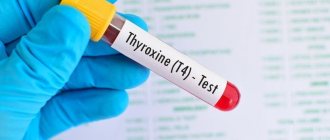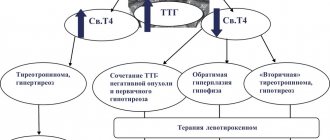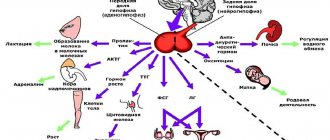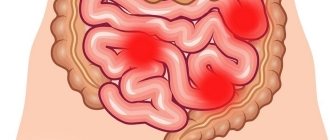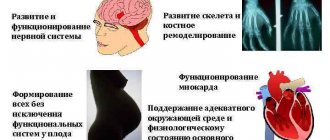Description of the disease
The thyroid gland begins to work already by the 12th week of intrauterine development, releasing three basic hormones into the body: thyroxine (T4), triiodothyronine (T3). They regulate the formation of organs and tissues, including the cerebral cortex, which is responsible for higher nervous activity.
The work of the gland and its participation in the regulation of various processes in the body continues throughout life, but in childhood it is especially important. Lack of hormones leads to delayed physical and mental development, delayed puberty, deterioration of metabolism and thermoregulation.
Classification of hypothyroidism in children
Depending on the mechanism of development, there are two main forms of hypothyroidism in children:
- congenital: present from the first day of life;
- acquired: formed after birth.
The level at which the failure occurred allows us to distinguish three types of pathology:
- primary: with this form of hypothyroidism in children, there is a malfunction of the thyroid gland itself;
- secondary: hypothyroidism is caused by a malfunction of the pituitary gland, which regulates the release of thyroid hormones;
- tertiary: caused by pathology of the hypothalamus, which is responsible for the functioning of the pituitary gland.
The third classification is based on the severity of symptoms of hypothyroidism in children:
- transient (transitory): problems arise periodically, then pass;
- subclinical: the amount of hormones in the blood is reduced, but there are no symptoms;
- manifest: there is both a hormone deficiency and symptoms of the disease.
Symptoms
At birth, symptoms may be vague and the first suspicions of pathology will become noticeable by 5-6 months of the baby’s life. This is due to the fact that hormone deficiency has varying degrees of severity. If the deficiency is severe at birth, then specialists will definitely pay attention to the jaundice and dryness of the baby’s skin, enlarged fontanel, and the baby will most likely weigh above average. If external signs are not noticeable initially and treatment is not started, then by 6 months the following may be observed:
- delays in physical and mental development;
- underdevelopment of many organs and systems;
- defects of the skin and mucous membranes, which are the result of impaired blood and lymph circulation or poor nutrition of body tissues.
In medicine, there are cases where congenital hypothyroidism in children manifests itself only at 5-6 years of age.
Causes of hypothyroidism in children
Among the causes that cause hypothyroidism in children of different ages, the most common are:
- malformations of the thyroid gland (absence, underdevelopment or displacement of the organ);
- exposure to ionizing radiation;
- chronic iodine deficiency;
- intrauterine infections;
- the presence of thyroid pathology in the mother at the time of pregnancy;
- taking a number of medications by the mother during pregnancy;
- abnormalities of the pituitary gland or hypothalamus;
- genetic defects in the synthesis of thyroid hormones or substances that regulate the functioning of the organ;
- inflammatory processes in the thyroid gland, hypothalamus, pituitary gland, as well as their injuries and tumors.
Consequences of the disease
The consequences of insufficient thyroid hormone production can be catastrophic for a child without the necessary treatment.
Consequences of congenital hypothyroidism:
- delay in physical, emotional and intellectual development;
- since thyroid hormones affect the functioning of many organs, we can talk about emerging pathologies also from the heart, nervous system and psyche;
- in advanced cases, myxedema occurs (insufficiency of thyroid hormones in tissues and other organs), which leads to the patient’s coma.
Dear patients, in our medical center you can do an ultrasound of the thyroid gland.
Symptoms of hypothyroidism in children
Signs of hypothyroidism in an infant are usually noticeable immediately after birth.
The baby has a lot of weight, swelling of the face and tongue, fingers and toes. The breathing of such babies is heavy, their voice is hoarse and rough. Doctors and parents often encounter prolonged jaundice in newborns, problems with healing of the umbilical wound, and the development of an umbilical hernia. As a rule, such children encounter problems during feeding due to a poorly developed sucking reflex. If a child is breastfed, even with congenital forms of hypothyroidism, its symptoms may not appear immediately. The deficiency is fully or partially compensated by maternal hormones, which the baby receives through milk. However, even in this case, delays in mental and physical development may gradually increase:
- decreased muscle tone;
- lethargy, immobility;
- retardation in height and weight;
- late closure of the fontanel;
- delayed teething;
- delay in the formation of basic skills (the ability to hold one's head up, roll over, sit down, stand, walk).
As a rule, a child with a deficiency of thyroid hormones is apathetic, has little interest in toys, and has poor contact with parents and others. He experiences dry skin, brittle hair, decreased immunity, and frequent constipation.
In children who are bottle-fed or mixed-fed, the signs of hypothyroidism progress faster, but much also depends on the form of the disease, its cause and the degree of deficiency. In mild cases, signs of deficiency are erased and begin to appear closer to school or even during puberty. The child has:
- excess body weight up to obesity, even against the background of moderate nutrition;
- growth retardation;
- delayed puberty;
- viscosity of thinking, deterioration in academic performance;
- lethargy, drowsiness, apathy, depressed mood.
In advanced cases, the consequences of hypothyroidism for the child are very severe: mental retardation, skeletal deformation, hearing and speech disorders, and underdevelopment of the reproductive system develop.
Forecast
If the pathology is detected early, the consequences of congenital hypothyroidism will not be detrimental to the patient’s health, but are assessed by doctors as favorable.
With proper therapy, bringing the main thyroid hormones to normal levels, we can say that nothing will hinder the child’s development (taking into account the fact that hormone replacement therapy will be lifelong).
If congenital hypothyroidism is detected not in the first months of life, but at 3-6, then the chances of complete normalization of the condition are significantly reduced, even with proper treatment. At the same time, it is possible to achieve the required level of psychophysical development of the child, but there is a high probability of lagging behind in intellectual development.
Diagnosis of hypothyroidism
A pediatric endocrinologist diagnoses hypothyroidism in children. The examination is aimed at timely detection of hormone deficiency, determining the form and cause of the disease. All newborn babies are required to have their thyroid-stimulating hormone (TSH) levels checked on days 4-5 of life. If it is in excess, a preliminary diagnosis of hypothyroidism is made.
An extensive laboratory examination includes determination of the level of hormones T3, T4, thyreglobulin, hormone binding index, detection of antibodies to thyroid hormones, and a test with thyrotropin-releasing hormone to assess the functioning of the pituitary gland.
In addition to tests, other diagnostic procedures are used: ultrasound and scintigraphy of the thyroid gland, determination of bone age (by x-ray of the knee joints, feet, hands), MRI or CT of the sella turcica, heart examinations (ECG, ultrasound) in the presence of related problems. If necessary, the child is referred for consultations to specialized specialists: ophthalmologist, neurosurgeon, neurologist, cardiologist, hematologist, etc.
Which doctor will help?
The treatment of congenital hypothyroidism in children is carried out by an endocrinologist together with a pediatrician.
I, Georgy Nikitich Romanov, am a qualified and experienced endocrinologist. My medical practice spans more than 20 years, during which time I have encountered various cases, including a disease such as congenital hypothyroidism, with which we successfully worked.
I acquired my skills not only at universities in our country, but also abroad (I completed internships in the UK, Germany, and Russia). The skills and experience I have gained help me accurately prescribe treatments for my patients.
At the moment, I am conducting face-to-face appointments at the Amadeus Clinic medical center in Gomel and conducting paid online consultations. As part of an online consultation, I can evaluate diagnostic results, treatment progress, adjust treatment, and more.
To sign up for a consultation, write to me in one of the suggested messengers: Viber, Skype, Instagram, VKontakte, WhatsApp.
Treatment of hypothyroidism in children
Treatment of hypothyroidism in children is aimed not only at eliminating specific symptoms, but also at eliminating the cause of the disease, if possible.
The main method of therapy is to compensate for the deficiency by taking hormones. The dose of the drug is selected individually and adjusted as necessary. If doctors are unable to eliminate the cause of hypothyroidism, replacement therapy will be lifelong. Additionally, various general strengthening measures are prescribed: massage, exercise therapy, good nutrition with a sufficient amount of vitamins, nootropic drugs for developmental delays, etc.
Prevention and prognosis for hypothyroidism in children
The prognosis for hypothyroidism in children depends on the form of the disease, the level of thyroid hormones in the blood, and the timeliness of detection of the deficiency. With timely administration of hormone replacement therapy, the child grows and develops in accordance with the norms. If the disease is discovered late, a complete cure is unlikely, since many disorders become irreversible.
Prevention of hypothyroidism in children consists of the preventive use of iodine preparations during pregnancy, monitoring the level of thyroid hormones in the expectant mother, and then in the child himself. If there is a predisposition to the disease, control should be especially strict even in the absence of problems.
The earlier your child's hypothyroidism is detected, the fewer problems he will experience due to hormone deficiency. Pediatric endocrinologists at the SM-Doctor clinic will conduct an appointment, assess the baby’s condition, and prescribe the necessary examinations and treatment. Make an appointment at the slightest suspicion of hormonal deficiency.
Congenital hypothyroidism
The goal of replacement therapy is to quickly normalize the level of T4 in the blood, and subsequently select a dose of L-T4 that will ensure stable maintenance of normal levels of T4 and TSH. The recommended starting dose of L-T4 is 10-15 mcg per kg body weight per day. In the future, regular follow-up examinations are necessary to select an adequate dose of L-T4. Prognosis Primarily depends on the timing of L-T4 replacement therapy. If this happens in the first or second week of life, mental and physical development disorders are almost completely prevented. Further, as the time from the birth of the child to the prescription of replacement therapy increases, the risk of development and severity of oligophrenia increases, up to the most severe forms.
Hypothyroidism is quite easily treated by taking thyroid hormone medications. The most effective and reliable of the drugs used for replacement therapy for hypothyroidism is synthetic (artificially produced) thyroid hormone. After starting treatment, you will need to visit your doctor regularly to determine the exact dose of the drug.
In most cases, regression of hypothyroidism symptoms begins within the first week of taking the drug. Complete disappearance of symptoms usually occurs within several months. Infants and older children with hypothyroidism require treatment without fail. Elderly patients and people with poor health may respond more slowly to the drug. - If hypothyroidism was caused by radiation therapy or resulted from removal of the thyroid gland, treatment will most likely be lifelong. Lifelong treatment may also be required when hypothyroidism occurs in the context of Hashimoto's disease. In some cases, however, thyroid function with Hashimoto's thyroiditis returns spontaneously. — If hypothyroidism occurs against the background of another serious pathology, thyroid function most often normalizes as the underlying disease is cured. — Hypothyroidism can be caused by taking certain medications. In such cases, the activity of the thyroid gland returns to normal after discontinuation of the drug. — With a latent (subclinical) form of hypothyroidism, treatment may not be required, but the patient needs medical supervision, the purpose of which is not to miss signs of disease progression. Today there is no accurate data in favor of the need for replacement treatment for latent hypothyroidism, and scientists have differing opinions on this matter. When deciding whether treatment is necessary in these cases, you and your doctor should discuss how the benefits of taking the medications weigh against the potential risks and financial costs of treating and managing the condition. People suffering from heart disease need particularly careful selection of drug doses, since excessive intake of the hormone increases the risk of chest pain (angina) or heart rhythm disturbances (atrial fibrillation).
Starting Treatment Your doctor will prescribe a drug that contains an active ingredient called levothyroxine sodium (such as Synthroid, Levoxil, or Levothroid). Take it exactly as prescribed. You should see a doctor 6-8 weeks after you start taking it to make sure the prescribed dose is adequate.
If the dose you receive is too small, you may still have signs of hypothyroidism: constipation, chilliness, lethargy, weight gain. Signs of an overdose may include nervousness, sleep disturbances, and tremors (tremors). If you have heart disease, an excess dose of the hormone can cause heart rhythm disturbances and chest pain. Patients with heart failure are usually started on a small dose of levothyroxine, gradually increasing it as needed. If hypothyroidism is severe at the time of diagnosis, treatment should be started immediately. Severe untreated hypothyroidism can lead to a rare but life-threatening complication - hypothyroid (myxedematous) coma.
Treatment of myxedema coma is carried out in an intensive care unit. The thyroid hormone drug is administered intravenously. If breathing is impaired, a device for artificial ventilation of the lungs is used. The patient is examined for the presence of concomitant cardiac disorders (including myocardial infarction) and appropriate treatment is prescribed.
Treatment of hypothyroidism during pregnancy is especially important because untreated hypothyroidism can cause damage to the developing fetus. - If hypothyroidism occurs during pregnancy, treatment should be started immediately. If hypothyroidism was detected before pregnancy, it is necessary to monitor the level of thyroid hormone with a corresponding adjustment of the dose of the drug taken. During pregnancy, the need for a dose of the hormone may increase by 25-50%. — Treatment may also be required in cases where hypothyroidism occurs after the birth of a child (postpartum hypothyroidism). With each new pregnancy, you will be recommended to be tested for hypothyroidism. In some cases, postpartum hypothyroidism goes away on its own; in other cases it remains lifelong and requires lifelong treatment.
Maintenance treatment Treatment for hypothyroidism is most often lifelong, so it is important to take the prescribed medication exactly as recommended. In some people, hypothyroidism is progressive, so the dosage of the hormone received needs to be gradually increased as thyroid function fades. In most patients treated with thyroid hormone drugs, signs of hypothyroidism reappear when these drugs are discontinued. In such cases, the drug should be resumed.
If hypothyroidism occurs as a complication of an infection or other serious illness, then after recovery the function of the thyroid gland is restored in most cases. To check the functioning of the thyroid gland, the intake of thyroid hormone medications is temporarily interrupted. In most patients, such withdrawal of drugs leads to a short-term return of symptoms of hypothyroidism (the body often sends a signal to the thyroid gland about the need to resume work with some delay). If the gland is able to produce enough hormone on its own, no further treatment is required. If the hormone level remains low, the drug should be resumed.
If you are taking thyroid hormone medications, you should visit your doctor every six months or year for a routine check-up. You will be asked to take a thyroid-stimulating hormone (TSH) test, which will show whether the level of the hormone is normal.
Treatment if the condition worsens Sometimes the symptoms of hypothyroidism (lethargy, constipation, chilliness, poor memory and ability to concentrate) persist despite treatment. This occurs when the dose of the hormone taken is insufficient or the drug is poorly absorbed from the gastrointestinal tract. The action of thyroid hormone can be blocked by intestinal diseases or by taking certain other medications. If you are taking calcium carbonate, cholestyramine, sucralfate, aluminum hydroxide, ferrous sulfate, or estrogen, your doctor may recommend increasing your dose of thyroid hormone. Calcium supplements should be taken at least 4 hours before (or 4 hours after) your next hormone dose.
Excessive doses of thyroid hormone can cause heart rhythm disturbances and, over time, osteoporosis. In the presence of concomitant heart diseases, an excessive dose of the hormone can cause angina pectoris (chest pain) or arrhythmia. Your doctor will monitor your body's thyroid hormone levels using a thyroid-stimulating hormone (TSH) blood test. If necessary, the doctor will recommend reducing the dose.
